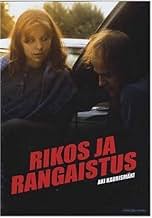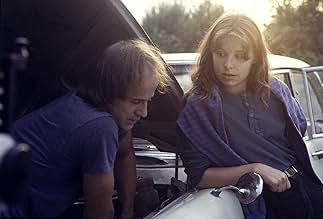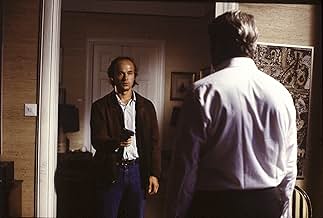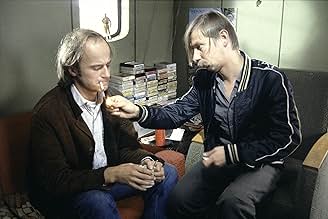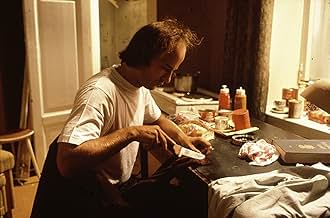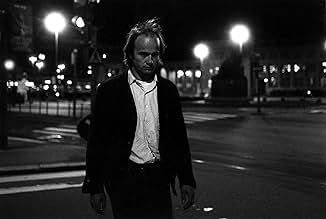Adaptation du roman de Dostoïevski, qui se déroule dans l'Helsinki d'aujourd'hui. Rahikainen, un ouvrier d'abattoir, assassine un homme et est forcé de vivre avec les conséquences de ses act... Tout lireAdaptation du roman de Dostoïevski, qui se déroule dans l'Helsinki d'aujourd'hui. Rahikainen, un ouvrier d'abattoir, assassine un homme et est forcé de vivre avec les conséquences de ses actes.Adaptation du roman de Dostoïevski, qui se déroule dans l'Helsinki d'aujourd'hui. Rahikainen, un ouvrier d'abattoir, assassine un homme et est forcé de vivre avec les conséquences de ses actes.
- Réalisation
- Scénario
- Casting principal
- Récompenses
- 2 victoires et 1 nomination au total
- Pianist
- (as Pedro's Heavy Gentleman)
- Drummer
- (as Pedro's Heavy Gentleman)
- Opera Singer
- (non crédité)
- Man at the Police Station
- (non crédité)
- Opera Singer
- (non crédité)
Avis à la une
The plot had even some surprising twists, and the ending is done so, that it made me wonder that maybe Kaurismäki has some personal experiences of such feels of guilt and isolation as the main male character. This film, even if it's done nearly 20 years ago, is more than fit to make us think about our current world, and the direction we are heading.
People seldom smile in Kaurismaki's Helsinki, and have pensive, reflective ways and a deliberateness about them, whether they are police inspectors or pastry shop employees. Rather than the process that brought Antti Rahikainen (Kaurismaki's Raskolnikov) and his conscience to turn himself in to the police, I was struck by the way the movie plays with the spectator's sympathies. Rahikainen inspires sympathy one moment and lack of it the next; then, once again, you develop sympathy followed by antipathy and a desire to see him punished. At least I found it to be the case, and it wasn't that I mentally chastised him for the murder, either. As Rahikainen himself twice said during the course of the movie, you don't really feel like he's killed a man, so much as a principle. The film doesn't go to great lengths to explain what principle that might be, but you can somehow intuit it, and even approve of his actions to some degree - at least in a very abstract sense. And it's not even like the murdered man is ever presented as being repulsive! If there was ever a crime movie more cerebral than this, I would really like to hear about it! One quality I admire in Kaurismaki that's perfectly illustrated by this movie is his use of interior spaces. The way he films rooms with people in them, though it's done in an absolutely subtle, functional and non-showy way, really gives a sense of their context within the world they inhabit and the thoughts and feelings that float around them in said rooms and interiors. The very last frame of the guard shutting the prison door behind Rahikainen after he's been speaking to Eeva (roughly the equivalent of Sonya from Dostoyevsky's novel), really gives a sense that the spaces you inhabit are mostly a reflection of your state of mind, your interior state. After having seen the young murderer in his grotty rented room before, emprisoned within his own musings and guilt, the literal prison he occupies after he turns himself in seems no more restictive of his freedom than his previous mental state. In this sense, Kaurismaki's Crime and Punishment is very similar to the spirit of Dostoyevsky's novel.
I find Kaurismaki's very basic approach to film-making to be refreshing compared to the cynic, gimmicky cinema of our days that is more content to wink at the audience than take the material it presents seriously. The dialogue is as sparse as the plot is thinly stretched and everything in 'Crime and Punishment' has a very minimalist feel to it. It's rather short, clocking at almost 90 minutes, but after Kaurismaki gets done with the setup and motive and general background of the killer, and this happens around the half mark, he just doesn't have a whole lot of places to go with the rest of the film.
As a debut and an exercise in film-making for the young director it's impressive, but it's also monotonous and very one-note and just not very interesting.
At the beginning, we're guided through a slaughterhouse. This is where the protagonist, Antti Rahikainen (Markku Toikka), works. This particular environment suits the film, as it prepares us for its subsequent tone. Rahikainen takes the rest of the day off and breaks into an apartment. Once there, he kills an old man. Unfortunately, there's a witness: Eeva Laakso (Aino Seppo), who however refuses to turn in the murderer, thinking he will himself confess the crime eventually.
Of course, that doesn't happen. Police inspector Pennanen (Esko Nikkari) is dead certain of Rahikainen's role in the story, given there's a motive and all (the victim accidentally killed Rahikainen's fiancée by running her over with a car). But with no evidence and no collaboration from Eeva, there are few chances the killer will be arrested.
Kaurismäki has done a remarkable job on his first film, mostly because he nails the mood: he shows us the murkiest sides of Helsinki, and almost everyone depicted in the movie is cold and unemotional, a factor which adds to the unsettling nature of the story. There's little room for humor, with only a few exceptions: Rahikainen's best friend Nikander (Matti Pellonpää), struggling with English lessons, and the straight, serious delivery of some dialogue, most notably the first conversation between Rahikainen and Eeva ("What's wrong with him?" "Nothing. He's dead." "How did he die?" "I killed him.").
An excellent human drama, and also the beginning of a brilliant career. Those interested in Finnish cinema should give this a look.
Le saviez-vous
- AnecdotesAki Kaurismäki's narrative directorial debut. He chose this project after reading François Truffaut's interview with Alfred Hitchcock, where Hitchcock claimed Crime and Punishment was the one book he would never adapt, because "it would be too difficult." Kaurismäki later admitted it was too difficult.
- Citations
Antti Rahikainen: [to Eeva Laakso] I'll tell you something. The man I killed is not important. I killed a louse, and became one myself. The number of lice remained constant. Unless I was one from the very beginning - but that's not important. I wanted to kill a principle, not a man.
- ConnexionsFeatured in Selección TCM: Aki Kaurismaki (2012)
- Bandes originalesCadillac
Written by Kim Brown, Denys Gibson, Ian Mallet, Stuart Graham Johnson and Vince Taylor
Performed by The Renegades
Meilleurs choix
- How long is Crime and Punishment?Alimenté par Alexa
Détails
Box-office
- Budget
- 1 726 378 FIM (estimé)
Contribuer à cette page


